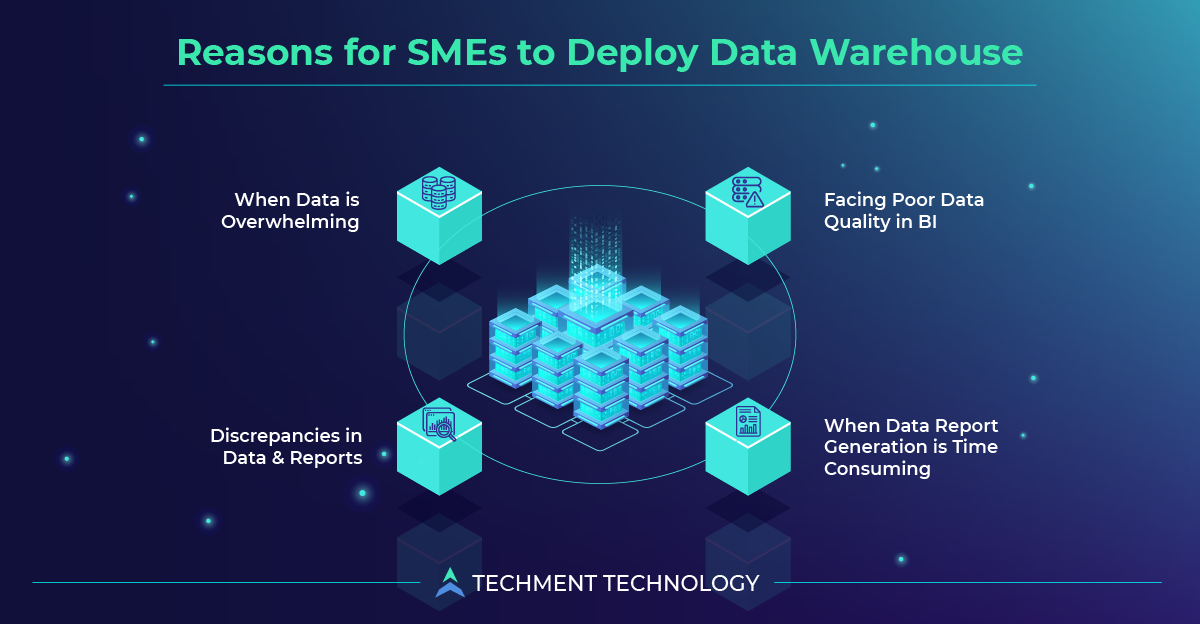Businesses often see inconsistencies in decision-making due to data silos and non-standardization of data formats. And, without having access to the right tools, the large volume of data can quickly be overwhelming and hard to understand. This is where data warehouses come into play to combine the data for enterprise-wide data analysis and reporting. Data warehouse is a relational database or a database management system containing large amounts of historical data and is designed to support an enterprise’s business intelligence (BI) activities.
As data is now an ever-growing asset, bigger enterprises and SMEs are struggling to manage overwhelming data. They face several entry barriers and external challenges while working with data. Here are a few important ones discussed:
- Understanding of data: Most of the time, SMEs aren’t sure of the returns and outcomes from data activities.
- Lack of In-house expertise: The team’s ability to learn about new prospects is usually constrained because they often want their team to be experts in specific tasks.
- Data collection & storage: SMEs see data digitalization as one of the biggest barriers, which hampers the relationship with customers or prospects.
- Data availability: SMEs rarely have unified data and face data integration issues.
Data can give a 360-degree view and assist decision-making; hence, choosing the right tool and proper data landscaping is necessary. A data warehouse promises all these benefits of data analytics for SMEs while saving costs and time in setting up in-house data infrastructure.
This will not only help in data integration from sources like ERP, CRM, etc., but also centralizes business by a single version of the truth, helps in metadata creation, provides faster query response for report generation, and many more. Thus, investing in a data warehouse can be a rational decision for SMEs is looking to expand their operations in data analytics.
4 Reasons for SMEs to Deploy Data Warehouse
SMEs is creating a culture of trust by sharing data & insights readily across the organization and building a progressive data culture. A successful and well-designed data warehouse will deliver new functionality for SMEs at regular intervals, which doesn’t need to be costly. Let’s see the condition for SMEs to derive value from a warehouse.

- When Data Report Generation is Time Consuming: Data analytics and reporting must be well-optimized, fast, and accessible. But this might take unnecessary time to generate the report, so they need a data warehouse. A data warehouse is used to create automated reports and get better access to the information. Structured data and detailed queries make it easier to analyze large amounts of data.
- When Data is Overwhelming: When employees cannot handle inundated data from various sources, it’s imperative to have the right tool in place, to make sense of your business data. According to Forrester’s report, on average, between 60% and 73% of all data within an enterprise goes unused for analytics. Therefore, a data warehouse should be employed to scale the business and efficiently handle additional inquiries.
- Discrepancies in Data & Reports: Dealing with humongous data brings differences and conflicting points compared to internal reports. Data warehouse converts such inconsistent data into a consistent format. It also ensures that data produced by different business divisions are of the same quality and standard as the data analytics platform requires.
A warehouse is capable of handling the following parameters to remove data discrepancies:
- It performs new validation checks when new tables are created.
- It updates existing validation checks when there are changes in underlying data.
- It validates incremental data as it arrives.
- It issues alerts when the number of errors reaches a critical level.
Facing Poor Data Quality in BI: Bad data quality affects business intelligence (BI) insights and decisions in SMEs, but deploying modern data warehouses can improve it. Data present in an enterprise may contain redundant data, inadequately recorded data, or misinformation of current records, which hamper data quality and reliability. The warehouse performs these checks to improve data quality:
- Completeness: Checks whether the data required are accessible, is there any loss of data in intermediate stages, or whether all sources are loaded with data.
- Uniqueness: This feature indicates if it is a single recorded instance, in the data set used. A high uniqueness score assures minimized duplicates, ultimately building trust in data analytics.
- Integrity: This indicates that the attributes are maintained correctly, even when data gets stored and used in diverse systems.
- Timeliness: This parameter defines that data is accessible or available immediately at the time of use. This reduces errors and streamlines operational processes.
All these above-mentioned checks are essential to ensure data integrity and quality. Whether an SME should choose a data warehouse or not, is subjective to whether it has large volume of disparate data or not.
Conclusion:
When Choosing a Data Warehouse, Business Operations Must be Considered
An SME can benefit from a data warehouse in many ways, including increased productivity, efficiency, and other business processes. At the same time, these methods can help company owners and leadership teams make intelligent decisions based on advanced tools that handle data.
Small and medium-sized enterprises cannot afford to neglect warehouses for data operations and storage management as a core business function in the modern era. These organizations must make sure to invest in a better data storage solution, one that will not only help in the organization of data but also make it easier to navigate through. The key is, finding the right one by checking team performance, business operations, and your customers’ needs.
With Techment’s data warehousing service, SMEs can experience better data management without worrying about time and effort. Know about Techment’s data-related services here.
 All Posts
All Posts


